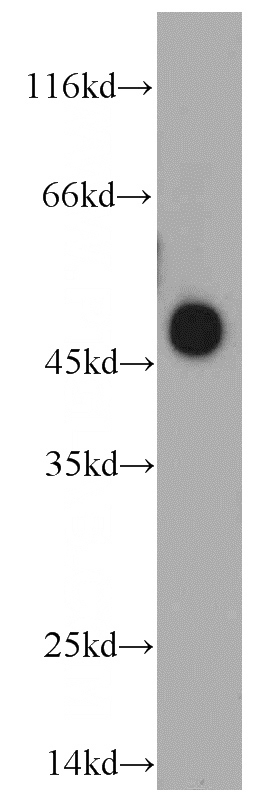-
Product Name
PXR antibody
- Documents
-
Description
PXR Rabbit Polyclonal antibody. Positive WB detected in HepG2 cells, A549 cells, MCF7 cells, mouse colon tissue. Positive IP detected in HepG2 cells. Observed molecular weight by Western-blot: 45-50kd
-
Tested applications
ELISA, WB, IP
-
Species reactivity
Human,Mouse,Rat; other species not tested.
-
Alternative names
BXR antibody; NR1I2 antibody; ONR1 antibody; Orphan nuclear receptor PAR1 antibody; Orphan nuclear receptor PXR antibody; PAR antibody; PAR1 antibody; PAR2 antibody; PARq antibody; Pregnane X receptor antibody; PRR antibody; PXR antibody; SAR antibody; SXR antibody
-
Isotype
Rabbit IgG
-
Preparation
This antibody was obtained by immunization of PXR recombinant protein (Accession Number: NM_003889). Purification method: Antigen affinity purified.
-
Clonality
Polyclonal
-
Formulation
PBS with 0.02% sodium azide and 50% glycerol pH 7.3.
-
Storage instructions
Store at -20℃. DO NOT ALIQUOT
-
Applications
Recommended Dilution:
WB: 1:200-1:2000
IP: 1:200-1:2000
-
Validations

HepG2 cells were subjected to SDS PAGE followed by western blot with Catalog No:114351(NR1I2 antibody) at dilution of 1:200

IP Result of anti-PXR (IP:Catalog No:114351, 4ug; Detection:Catalog No:114351 1:500) with HepG2 cells lysate 3600ug.
-
Background
Pregnane X receptor (PXR; NR1I2), a member of the nuclear receptor superfamily, plays a key role in the induction of genes involved in drug transport and metabolism. It modulates drug transport and metabolism through the regulation of target genes responsible for the transport and conversion of chemicals into metabolites that are more easily eliminated from the body [PMID: 22609277]. It is also emerging as an endobiotic receptor that regulates the inflammatory response. In addition, PXR acts as a transcription factor that activates the transcription of multiple genes involved in the metabolism and secretion of potentially harmful xenobiotics, drugs and endogenous compounds [PMID: 19297428].
-
References
- Zhou W, Lin J, Chen H, Wang J, Liu Y, Xia M. Retinoic acid induces macrophage cholesterol efflux and inhibits atherosclerotic plaque formation in apoE-deficient mice. The British journal of nutrition. 114(4):509-18. 2015.
Related Products / Services
Please note: All products are "FOR RESEARCH USE ONLY AND ARE NOT INTENDED FOR DIAGNOSTIC OR THERAPEUTIC USE"
